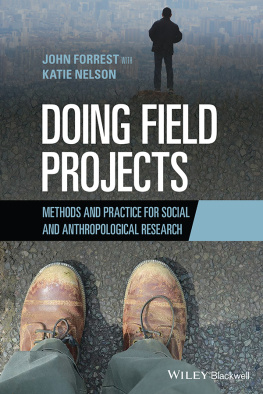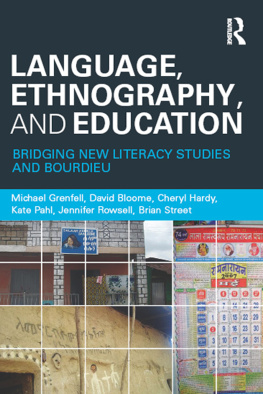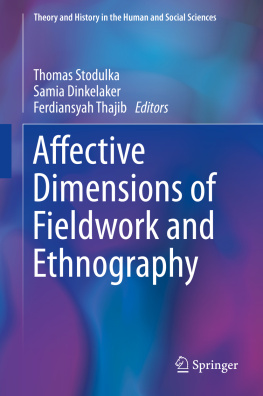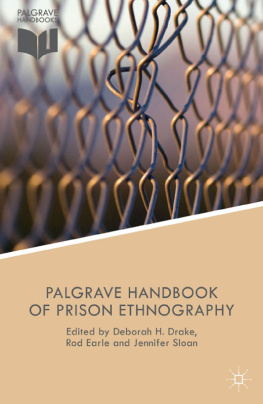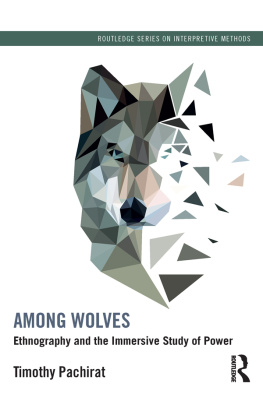
ETHNOGRAPHY IN SOCIAL SCIENCE PRACTICE
Ethnography in Social Science Practice explores ethnographys increasing use across the social sciences, beyond its traditional bases in social anthropology and sociology. It explores the disciplinary roots of ethnographic research within social anthropology, and contextualizes it within both field and disciplinary settings.
The book is in two parts: explores the stages of ethnographic research via a selection of multidisciplinary case studies. A number of key questions are explored:
What exactly is ethnographic research and what makes it different from other qualitative approaches?
Why did ethnography emerge within one social science discipline and not others?
Why did its adoption across the social sciences prove problematic?
What are the methodological advantages and disadvantages of doing ethnographic research?
Why are ethnographers so concerned by issues of ethics, politics, representation and power?
What does ethnography look like within different social science disciplines?
The book is aimed at social science students at both undergraduate and postgraduate level and each chapter has pedagogic features, including reflective activities and suggested further readings for students.
Julie Scott Jones is a senior lecturer in sociology at the Manchester Metropolitan University. Her research interests focus on identity, worldview construction and meaning systems. Recent publications include Fundamentalism and Global Security in Encyclopaedia on Globalisation and Human Security (Praeger Security Press, 2009) and Being the Chosen: Exploring a Fundamentalist Worldview (Ashgate, 2010).
Sal Watt is a lecturer in psychology at Liverpool Hope University. Her interests include organizational behaviour, identity and commitment. She is active in teaching and encouraging wider application of qualitative research techniques and, in particular, ethnography in psychology.
ETHNOGRAPHY IN SOCIAL SCIENCE PRACTICE
Edited by
Julie Scott Jones and
Sal Watt

LONDON AND NEW YORK
First published 2010
by Routledge
2 Park Square, Milton Park, Abingdon, Oxon, OX14 4RN
Simultaneously published in the USA and Canada
by Routledge
270 Madison Avenue, New York, NY 10016
Routledge is an imprint of the Taylor & Francis Group, an informa business
This edition published in the Taylor & Francis e-Library, 2010.
To purchase your own copy of this or any of Taylor & Francis or Routledges collection of thousands of eBooks please go to www.eBookstore.tandf.co.uk.
2010 Julie Scott Jones and Sal Watt; individual chapters, the contributors
All rights reserved. No part of this book may be reprinted or
reproduced or utilised in any form or by any electronic, mechanical,
or other means, now known or hereafter invented, including photocopying
and recording, or in any information storage or retrieval system,
without permission in writing from the publishers.
British Library Cataloguing in Publication Data
A catalogue record for this book is available from the British Library
Library of Congress Cataloging in Publication Data
Ethnography in social science practice/edited by Julie Scott Jones
and Sal Watt.
p. cm.
Includes bibliographical references.
1. Ethnology Research. 2. Ethnology Methodology.
I. Jones, Julie Scott, 1966. II. Watt, Sal.
GN345.E7825 2010
305.8001 dc22 2009039719
ISBN 0-203-87630-X Master e-book ISBN
ISBN 10: 0415543479 (hbk)
ISBN 10: 0415543495 (pbk)
ISBN 10: 020387630X (ebk)
ISBN 13: 9780415543477 (hbk)
ISBN 13: 9780415543491 (pbk)
ISBN 13: 9780203876305 (ebk)
FOR MILLIE AND ANNA
FOR DINK, FREDA AND MY BOYS
CONTENTS
JULIE SCOTT JONES
|
JULIE SCOTT JONES
|
HELEN JONES
|
SAL WATT
|
DAVE RANDALL AND MARK ROUNCEFIELD
|
WENDY LAVERICK
|
ANNA GRAHAM AND ROSEMARY KILPATRICK
|
SAL WATT AND JULIE SCOTT JONES
|
JOHN E. GOLDRING
|
CLIVE PALMER
|
JULIE SCOTT JONES AND SAL WATT
|
DUNCAN LIGHT
|
SAL WATT
|
CONTRIBUTORS
John E. Goldring is a lecturer in sociology at the Manchester Metropolitan University. He is an ethnographer and has spent much of his research career exploring gay mens relationships with each other, their families and friends and their health and well-being. His experience of being a gay married man has encouraged him to consider alternative gay identities and to attempt to give voice to those who could be considered on the margins of the gay community. His research has taken a late-modern perspective to explore the changing social and legal climate that gay men have faced since the decriminalization of homosexuality in 1967.
Anna Graham is currently a lecturer in education at Liverpool Hope University. She trained as a primary school teacher at Homerton College, Cambridge and has been a practitioner and researcher since 1995. She completed her MPhil degree at Queens College, Cambridge and is currently completing her PhD. Her research examines the implications of poverty and social exclusion for childrens primary schooling.
Helen Jones is a principal lecturer in criminology at the Manchester Metropolitan University. She is a feminist, teacher, researcher, writer and activist. She teaches on a range of criminology and criminal justice topics. At a national level, Helen has been a consultant on the Home Office Sex Offences Review; the Victims of Violence and Abuse Prevention Programme (VVAPP); and the Inter-Ministerial Advisory Panel on Sexual Violence. Over the years, she has provided consultancy and training to the Rape and Sexual Abuse Centre in Merseyside and often speaks about the rape crisis movement at conferences and in the media. She continues to provide consultancy to the national Rape Crisis organization and in 2008 co-authored Rape Crisis: Responding to Sexual Violence.
Rosemary Kilpatrick prior to retirement was professor of childhood and youth studies at Liverpool Hope University and previously held the position of Director of the Institute of Child Care Research at Queens University, Belfast. She has extensive professional experience as a forensic psychologist working with children and young people in the education, care and justice systems. Her academic career has mirrored this professional experience with a focus on marginalized young people and an increasing interest in, and use of, participatory and visual techniques.
Wendy Laverick is a lecturer in criminology at the Manchester Metropolitan University. Her research interests span all aspects of violence, harm and social justice. She has an interdisciplinary interest in issues of gender and globalization and is currently applying these substantive areas to the study of transnational crime.


